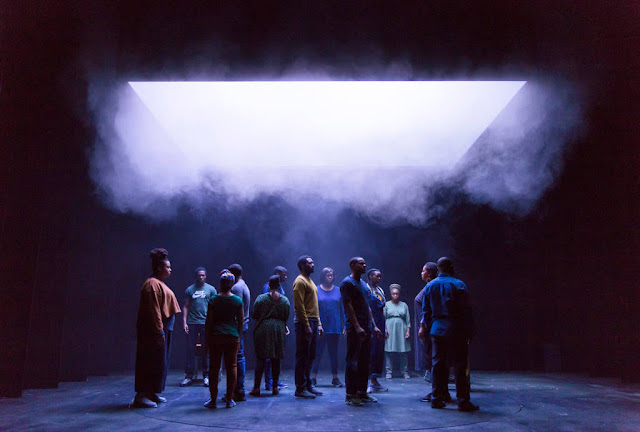Review: Ear For Eye at Royal Court Theatre
 |
©Stephen Cummiskey
|
The mind-blowing ear for eye, written and directed by the inimitable debbie tucker green, is a transatlantic form-breaking tour de force in three non-linear parts.
Part one begins with mysterious subjects roaming a foggy, glass enclosure. Their silhouettes occasionally press against the barrier while hypnotic chords, courtesy of Christopher Shutt, drone on. Designer Merie Hensel’s monolithic viewing gallery gratifyingly draws us in to an oppressed world where unrest is brewing, though initial enjoyment is quickly curtailed by an all-familiar stomach-churning realisation: the shady humans in confinement are all black.
Award-winning tucker green scrutinises a nauseatingly persistent allegory, i.e., blacks as exotic wild specimens observed, from a safe distance, by enlightened whites. She proposes that, even in 2018, black people are perceived pejoratively, leading to unspeakable racial, criminal and political injustices.
Poetic rhetoric, exquisitely delivered by Older Woman (Angela Wynter), reminds us that, despite scientific evidence proving black humans existed ‘before’ them, many whites maintain the warped notion they deserve the high ground on all fronts. tucker green’s hard-hitting play suggests, though there's been progress, urgent change is still required: ‘...we didn't raise you to look at no floor...’
But what form should change take? As the glass cage lifts (though menacingly remaining overhead) we are privy to black citizens’ unedited private debates about their daily struggles with discrimination and abuse at the hands of US and UK white power structures, and whether stoic compliance or aggressive activism is the solution.
In brilliantly astute scenes with rapid-fire, interrupted half-sentences, lit stylishly by Paule Constable, families agonise in micro detail about the efficacy of protest. Parents remain ultra-cautious but the social-media generation craves drastic action: ‘Gimme one reason to not’ is the memorable refrain resounding throughout.
The reason ‘to not’ is thrashed out in greater depth during part two. Inquisitive black student (Lashana Lynch) drills her condescending white lecturer (Demetri Goritsas) over the motives behind US mass shootings. The expert spouts psycho-sociological theories to explain away the white boys’ murderous acts. He claims there are valid reasons for white atrocities but Lynch refuses to yield: whites are 'terrorists...', too. Goritsas plays the know-it-all academic so believably: his passive-aggressive patronising stance is so unbearable it’s almost hilarious; while Lynch’s quiet frustration and intelligent quick-witted ripostes outplay him beautifully.
Less palatable is the intensely disturbing part three, where white American and British citizens regurgitate Jim Crow laws prevalent in US southern states and British and French colonial Jamaican slave codes. We watch uneasily as white folk, on big screens, shuffle awkwardly in their seats while repeating apartheid-style legislation enforced by their not-so-distant ancestors. Seeing whites so exposed and reduced to voicing these horrific truths feels like deliberate pay-back, and, although difficult to watch, perhaps offers vindication for more stringent black activism.
Slight reservations came from the play’s sheer scope. It’s deliberately voluminous and repetitive in dealing with rarely-aired content, but towards the end it starts to feel a little laboured and unrelenting.
Likewise, though the superb 16-strong ensemble moves fluidly as one throughout, thanks to Movement Director Vicki Manderson, so many silent partners on stage felt wastefully redundant at times— it would have been lovely to hear more from the powerhouse Michelle Greenidge, for example.
In spite of this, and quite refreshingly, the younger actors are allowed to shine. Especially impressive performances come from Shaniqua Okwok, Tosin Cole and Jamal Ajala who is the first deaf black actor at the Royal Court.
ear for eye is a diverse poetic feast that unapologetically batters you with deeply entrenched racist tropes and their effect on the rights and freedoms of blacks. The beat is hammered so hard you can’t ignore the revolutionary message. There’s hope the younger generation will find a way to step up—breaking through the glass ceiling; enduring the tear gas—to shape a new black identity.
Cocoa’s verdict: With such astounding writing this is a must—though be prepared—it’s no walk in the park!
⭐⭐⭐⭐
ear for eye is on at the Royal Court from 25 October–24 November 2018
Running time: 2hrs 10mins (no interval)
ear for eye is on at the Royal Court from 25 October–24 November 2018
Running time: 2hrs 10mins (no interval)

Comments
Post a Comment